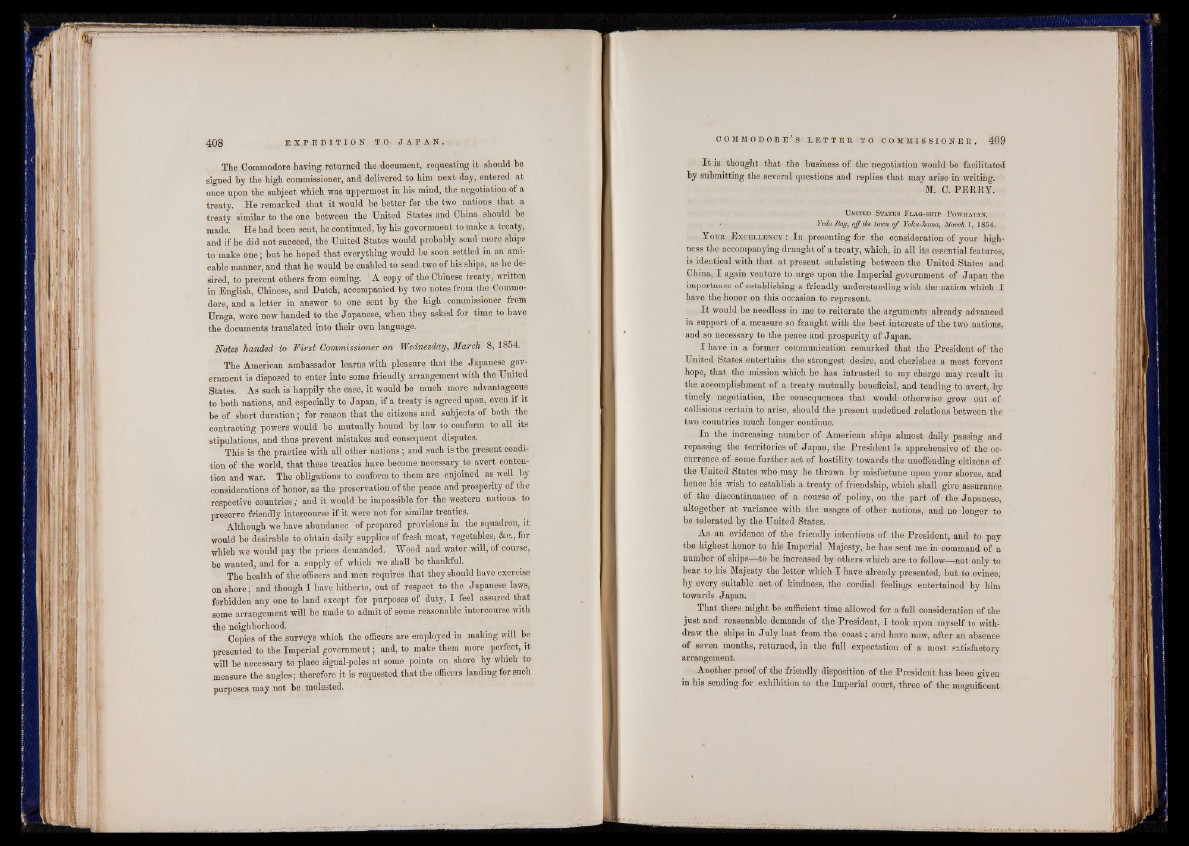
The Commodore having returned the document, requesting it should he
signed by the high commissioner, and delivered to him next day, entered at
onee upon the subject which was uppermost in his mind, the negotiation of a
treaty. He remarked that it would be better for the two nations that a
treaty similar to the one between the United States and China should be
made. He had been sent, he continued, by his government to make a treaty,
and if he did not succeed, the United States would probably send more ships
to make one; but he hoped that everything would be soon settled in an amicable
manner, and that he would be enabled to send two of his ships, as he desired,
to prevent others from coming. ■ A copy of the Chinese treaty, written
in English, Chinese, and Dutch, accompanied by two notes from the Commodore,
and a letter in answer to one sent by the high commissioner from
Uraga, were now handed to the Japanese, when they asked for time to have
the documents translated into their own language.
Notes handed to First Commissioner on Wednesday, March 8, 1854.
The American ambassador learns with pleasure that the Japanese government
is disposed to enter into some friendly arrangement with the United
States. As such is happily the case, it would be much more advantageous
to both nations, and especially to Japan, if a treaty is agreed upon, even if it
be of short duration; for reason that the citizens and subjects of both the
contracting powers would be mutually bound by law to conform to all its
stipulations, and thus prevent mistakes and consequent disputes.
This is the practice with all other nations; and such is the present condition
of the world, that these treaties have become necessary to avert contention
and war. The obligations to conform to them are enjoined as well by
considerations of honor, as the preservation of the peace and prosperity of the
respective countries; and it would be impossible for the western nations to
preserve friendly intercourse if it were not for similar treaties.
Although we have abundance of prepared provisions in the squadron, it
would be desirable to obtain daily supplies of fresh meat, vegetables, &e., for
which we would pay the prices demanded. Wood and water will, of course,
be wanted, and for a supply of which we shall be thankful.
The health of the officers and men requires that they should have exercise
on shore; and though I have hitherto, out of respect to the Japanese laws,
forbidden any one to land except for purposes of duty, I feel assured that
some arrangement will be made to admit of some reasonable intercourse with
the neighborhood.
Copies of the surveys which the officers are employed in making will be
presented to the Imperial government; and, to make them more perfect, it
will be necessary to place signal-poles at some points on shore by which to
measure the angles; therefore it is requested that the officers landing for such
purposes may not be molested.
I t is thought that the business of the negotiation would be facilitated
by submitting the several questions and replies that may arise in writing.
M. C. PERRY.
Un it ed States F lag- s h ip P owhatan,
Yedo Bay, off the town o f Yoku-hama, March, 1, 1854.
Your E xcellency : In presenting for the consideration of your highness
the accompanying draught of a treaty, which, in all its essential features,
is identical with that at present subsisting between the United States and
China, I again venture to urge upon the Imperial government of Japan the
importance of establishing a friendly understanding with the nation which I
have the honor on this occasion to represent.
I t would be needless in me to reiterate the arguments already advanced
in support of a measure so fraught with the best interests of the two nations,
a,nd so necessary to the peace and prosperity of Japan.
I have in a former communication remarked that the President of the
United States entertains the strongest desire, and cherishes a most fervent
hope, that the mission which he has intrusted to my charge may result in
the accomplishment of a treaty mutually beneficial, and tending to avert, by
timely negotiation, the consequences that would otherwise grow out of
collisions certain to arise, should the present undefined relations between the
two countries much longer continue.
In the increasing number of American ships almost daily passing and
repassing the territories of Japan, the President is apprehensive of the occurrence
of some further act of hostility towards the unoffending citizens of
the United States who may be thrown by misfortune upon your shores, and
hence his wish to establish a treaty of friendship, which shall give assurance
of the discontinuance of a course of policy, on the part of the Japanese,
altogether at variance with the usages of other nations, and no longer to
be tolerated by the United States.
As an evidence of the friendly intentions of the President, and to pay
the highest honor to his Imperial Majesty, he has sent me in command of a
number of ships—to be increased by others which are to follow—not only to
bear to his Majesty the letter which I have already presented, but to evince,
by every suitable act of kindness, the cordial feelings entertained by him
towards Japan.
That there might be sufficient time allowed for a full consideration of the
just and reasonable demands of the President, I took upon myself to withdraw
the ships in July last from the coast; and have now, after an absence
of seven months, returned, in the full expectation of a most satisfactory
arrangement.
Another proof of the friendly disposition of the President has been given
in his sending for exhibition to the Imperial court, three of the magnificent